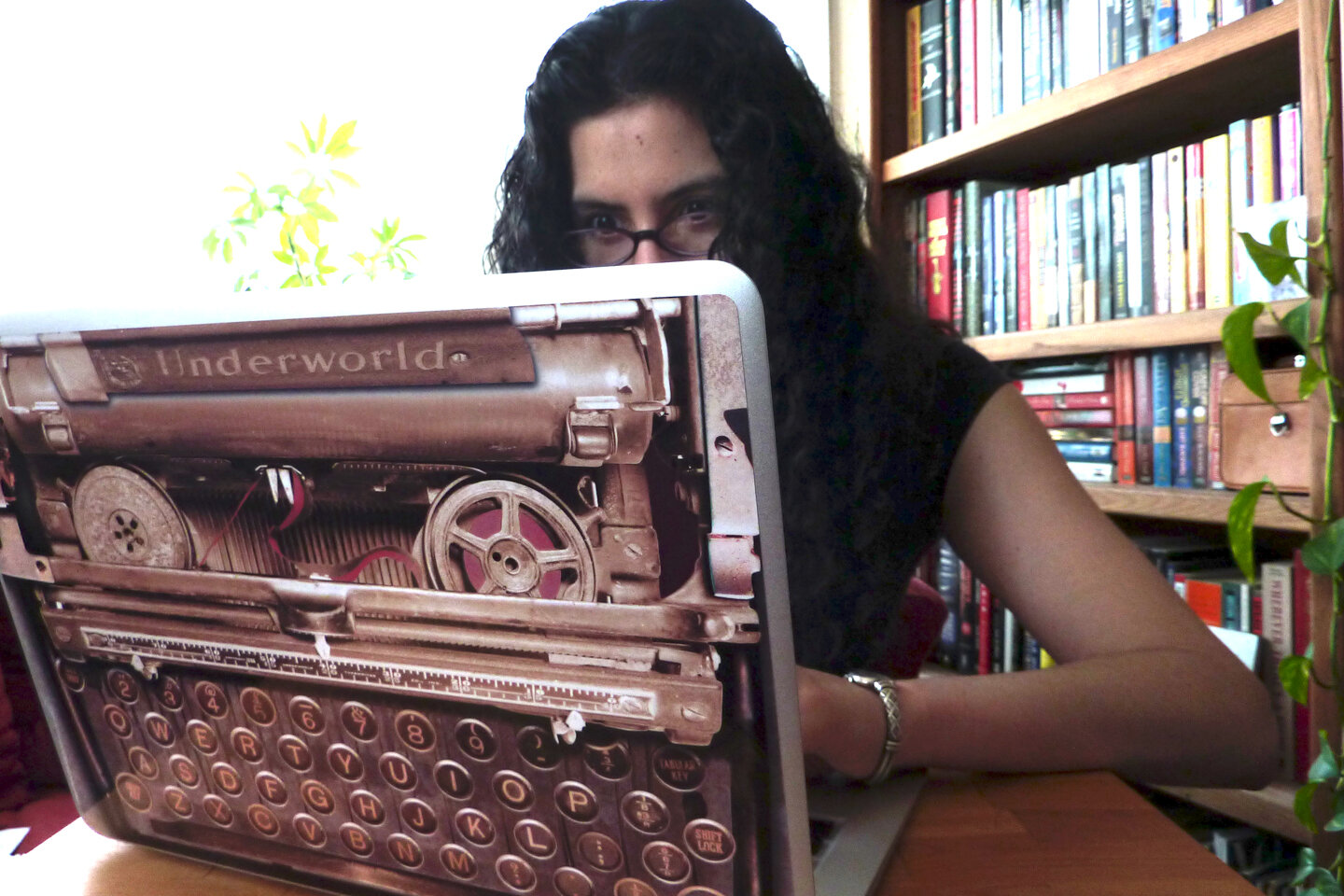Writing during a previous NaNoWriMo.
I have a love-hate relationship with deadlines. I love the freedom of exploring research and ideas with no end goal in sight, but without an external deadline, I will never complete a project. I’ve learned enough about myself over the years to know this is true. The only reason I completed a draft of my first novel, Artifact, was because I’d discovered National Novel Writing Month, aka NaNoWriMo, which was relatively new at the time.
The NaNoWriMo challenge is to write a 50,000-word draft of a novel, from scratch, in November—a month with only 30 days. Most importantly, you sign up to publicly declare your intentions, and you get all of the pep talks, writing meet-ups, and general buzz of energy that goes along with the challenge. Having set out to accomplish such a goal, it’s not realistic to go back and edit your words to make them perfect. Instead, you get your whole story down on the page, to revise and build out later.
For an unpublished writer, NaNoWriMo is a concrete deadline. It was an important lesson I needed to learn. It’s how I completed a full rough draft and typed two glorious words: “the end.”
Now that I’m a published author with ten novels out in the world, I often have deadlines imposed by publishers. Which is terrific for me.
But what about when I don’t have a solid deadline? I get stuck, which is what I’ve been experiencing for the past two weeks.
Several of the notebooks filled with ideas for the Secret Staircase Mysteries (you can see my earlier working title The Vanishing of Tempest Raj).
Two weeks ago I turned in revisions on my first Secret Staircase Mystery, to be published by St. Martin’s Minotaur (title and release date coming soon!). I’m incredibly excited about this new series, and I’m also eager to finish the next Accidental Alchemist novel I drafted in 2020. Which should be a perfect plan, because my ideas are always freshest when I alternate between projects and let my subconscious mull over ideas.
Then what’s the problem?
I don’t have a deadline.
Yes, I love this new book. Yes, readers are getting in touch on a regular basis to ask for an update for when they’ll get to read Zoe and Dorian’s latest adventure. And yes, I’m having so much fun with the rabbit hole of research (alchemy! witches! Portland’s hidden history!).
NaNoWriMo and its sister challenge Camp NaNoWriMo are nowhere in sight. Therefore I’m publicly declaring my own personal 30-day writing challenge, beginning February 10.
Working on the next Accidental Alchemist novel on paper.
I could simply revise my mess of a draft from 2020. But upon reading it through, a better approach is called for.
I’m taking my earlier ideas, but writing from scratch. I’m in love with the story, but I see now that it started in the wrong place.
Can I rewrite the whole book in 30 days without the energy of NaNoWriMo behind me? I’m not sure. But by telling all of you what I’m attempting to accomplish, my hope is that my brain will treat this as the real deadline I want it to be, and that the rewrite will be a book I love even more than the ideas I love from my last draft.
Why do I think this is the best approach? Because I’ve done it three times before, and each time it was the right decision.
The three previous books I wrote from scratch after tossing early drafts are Artifact, The Accidental Alchemist, and my new Tempest Raj novel that kicks off the Secret Staircase mystery series (🗝A locked-room mystery 💀A family curse 📚And the magic of sliding bookshelves, hidden rooms, and secret gardens…).
The time spent working on the abandoned drafts was never wasted time. It was all part of the writing process. For me, I can best get into the groove of what my characters are saying and doing if I’m writing from scratch instead of revising. I might re-type parts of scenes from the hard copy resting on my desk at my elbow, but with small-but-mighty tweaks that make all the difference.
Am I taking time off to do this? Nope. I’ve never been good with endless free time. I love my day job, so I’ve created a flexible schedule so I can have both careers (more details about that on publicist Dana Kaye’s Your Breakout Book podcast, if you’re interested). So I’ll be working during writing sprints after my sunrise walks in the hills, at my local Sisters in Crime chapter’s write-ins over lunch, and during other set chunks of time.
Wish me luck!
Keep in touch via my monthly email newsletter and follow my 30 day experiment on Instagram.



